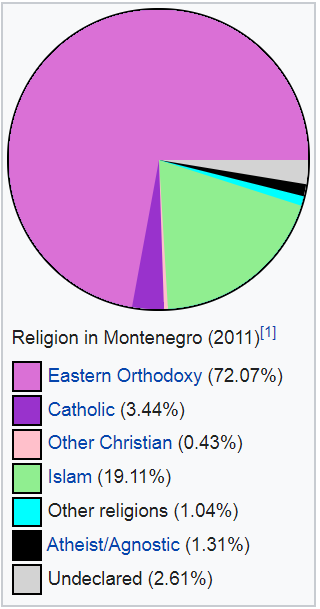Christianity
Eastern Orthodoxy
Eastern Orthodox Christianity is the dominant religion in Montenegro. Adherents of Eastern Orthodoxy in Montenegro are predominantly
ethnic Montenegrins and Serbs. Ethnic Serbs of Montenegro are adherents of the Serbian Orthodox Church and its dioceses in Montenegro:
Metropolitanate of Montenegro and the Littoral, Eparchy of Budimlja and Nikšić, parts of Eparchy of Mileševa, and parts of Eparchy of
Zahumlje and Herzegovina. Ethnic Montenegrins are divided between the Serbian Orthodox Church and the independent Montenegrin Orthodox
Church (which is consider by the Serbian Orthodox Church and the other autocephalous Orthodox Churches, a non-canonical 'schismatic'
Orthodox church).
Catholic Church
Most Catholics are ethnic Albanians and Croats as well as some Montenegrins. In some municipalities where Albanians form a majority,
like Tuzi, are adherents of Catholic Christianity. Catholicism is also present in Boka Kotorska, where there is a significant presence
of ethnic Croats.
Islam
Muslims form the largest minority religion in the country. Montenegro's 118,477 Muslims make up 19.11% of the total population. Muslims
in Montenegro are divided into two main groups, and further subgroups: Slavic Muslims (Bosnian-speaking ethnic Bosniak Muslims,
Montenegrin-speaking ethnic Montenegrin Muslims and Other Slavic Muslims, including Gorani, and other Slavs of the Muslim faith who
identify by religion rather than by ethnicity) and Albanian Muslims.
Islam is the dominant religion in the northeastern
municipalities, which are part of the Sandžak geographical region, and in municipalities where Albanians form a majority. Islam is the
majority religion in Rožaje, Plav, Gusinje, Ulcinj and Petnjica.
Judaism
In February 2012, the Montenegrin Prime Minister Igor Lukšić signed an agreement with the Montenegrin Jewish community to grant
official recognition of Jews as a minority in Montenegro. The agreement also established Judaism as the country's fourth official
religion, along with the Catholic Church, Eastern Orthodox Christianity, and Islam.
Atheism
The majority of Montenegro's population, 98.69%, declares to belong to a religion, though observance of their declared religion may
vary widely.
On the census from 2011, atheists, those who declared no religion, comprised about 1.24% of the whole population,
and agnostics 0.07%.
Religiosity is lowest in the Bay of Kotor region and the capital city of Podgorica.
Municipalities
with highest share of atheists are Herceg Novi (2.43%), Kotor (2.03%), Podgorica (1.99%) and Tivat (1.7%). In contrast, Rožaje has
the fewest atheists, who make up only 0.01% of its population.
In some municipalities more than half of population are undeclared,
however.









